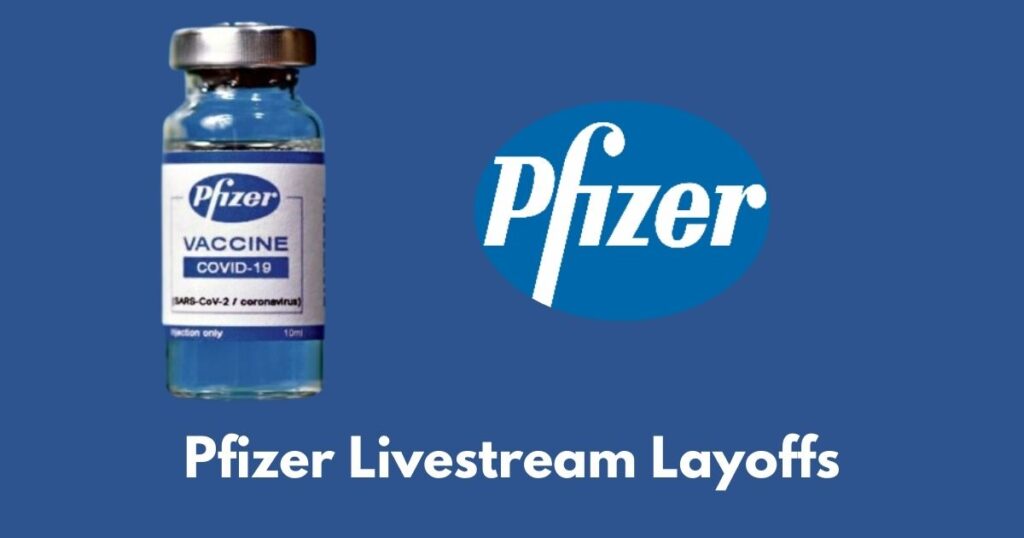In the annals of corporate missteps, few events have sent shockwaves through the business world quite like the Pfizer layoffs livestream. This unprecedented move by one of the world’s pharmaceutical giants not only sparked intense debate but also raised crucial questions about the ethics of remote workforce management in the digital age. Let’s dive deep into this corporate communications catastrophe and unpack its far-reaching implications.
The Fateful Day: When Pfizer Went Live
On what seemed like an ordinary workday, thousands of Pfizer employees logged into a company-wide livestream, expecting routine updates. Instead, they found themselves witnessing a pivotal moment in corporate history – one that would change their lives and ignite a global conversation about the dos and don’ts of remote layoffs.
The livestream, conducted with all the warmth of a coldly calculated business decision, left employees feeling like mere numbers on a spreadsheet. The clinical delivery of life-changing news via a computer screen epitomized everything wrong with impersonal corporate communications.
“I’ve given 15 years to this company, and this is how they let me go?” – Anonymous Pfizer Employee
The human toll was immense. Stories emerged of employees breaking down in tears, families suddenly facing uncertain futures, all because of a poorly executed corporate strategy. The Pfizer layoffs livestream wasn’t just another corporate announcement; it was a seismic event that shook the foundations of employee-employer relationships.
Pfizer: From Pandemic Hero to Corporate Villain
Pfizer, once hailed as a savior for its rapid development of the COVID-19 vaccine, saw its reputation plummet overnight. The company’s journey from pill-pusher to pandemic hero, and then to corporate villain, is a cautionary tale of how quickly public perception can shift.
Pfizer’s Global Footprint
- Operations: Present in more than 180 countries
- Workforce: Over 80,000 employees worldwide
- Revenue: $81.3 billion in 2021
This global reach meant that the layoffs livestream didn’t just affect a few hundred employees – it had ripple effects across economies and communities worldwide.
The Perfect Storm: What Led to the Layoffs
Even pharmaceutical giants aren’t immune to market pressures. Pfizer, despite its pandemic-era success, faced a confluence of challenges:
- Post-pandemic market shifts: Declining demand for COVID-19 products
- Patent cliffs: Key drugs losing exclusivity
- Increased competition: Emerging players in the biotech space
- Regulatory pressures: Evolving healthcare policies worldwide
- R&D costs: The ever-increasing expense of drug development
These factors created a pressure cooker situation, forcing Pfizer to consider cost-cutting measures. But the decision to announce these measures via livestream would prove to be a critical error.
The Livestream Heard ‘Round the World
The Pfizer layoffs livestream was a masterclass in how not to handle sensitive corporate communications. Let’s break down the event:
- Duration: A surprisingly brief 15-minute announcement
- Presenter: A high-level executive, not the CEO
- Content: Heavy on financial jargon, light on empathy
- Q&A: None. The stream ended abruptly after the announcement
This approach ignored years of best practices in change management and employee communications. It’s as if Pfizer forgot the basic principle that employees are human beings, not just resources to be allocated or discarded at will.
Read Also: What is 702 SW 8th St charge on credit card and banking statements?
Employee Reactions: A Tsunami of Emotions
The response was swift and furious. Social media platforms exploded with outrage as shocked Pfizer employees vented their frustrations. The range of emotions swept through the Pfizer workforce:
- Shock: Many couldn’t believe what they were hearing
- Betrayal: Loyal employees felt stabbed in the back
- Anxiety: Uncertainty about the future set in quickly
- Solidarity: Employees banded together, offering support
- Defiance: Some called for unionization or legal action
These raw, human reactions underscored the magnitude of Pfizer’s miscalculation. In trying to streamline the process, they’d inadvertently dehumanized it.
Déjà Vu: Echoes of Better.com
The Pfizer layoffs livestream drew immediate comparisons to the infamous Better.com incident, where CEO Vishal Garg fired 900 employees over a Zoom call. Let’s compare:
| Aspect | Pfizer | Better.com |
| Medium | Livestream | Zoom call |
| Number affected | Thousands | 900 |
| Delivery | Cold, impersonal | Blunt, shocking |
| Public reaction | Outrage | Disbelief |
| Executive consequences | TBD | CEO stepped down temporarily |
The similarities were striking, begging the question: Why haven’t companies learned from past mistakes?
The Ethics of Remote Layoffs
The COVID-19 pandemic accelerated many workplace trends, including the unfortunate practice of remote layoffs. While digital terminations offer certain efficiencies, they come with a host of ethical concerns:
- Lack of personal touch: Difficult to convey empathy through a screen
- Increased anxiety: Employees left to process news alone
- Security risks: Potential for unauthorized recording or sharing of sensitive information
- Legal ambiguities: Unclear termination procedures in a digital setting
- Cultural insensitivity: One-size-fits-all approach ignores regional differences
The Human Element: More Than Just Numbers
At the heart of the Pfizer layoffs livestream controversy is the glaring absence of human touch. Layoffs are more than just business decisions; they’re life-altering events for those affected. The emotional journey of a laid-off employee is complex and deeply personal:
- Shock and disbelief
- Anger and betrayal
- Anxiety about the future
- Grief for the loss of professional identity
- Eventual acceptance and moving forward
A livestream announcement fails to address any of these emotional needs, leaving employees to grapple with these feelings in isolation.
Corporate Responsibility in the Digital Age
Companies, especially those of Pfizer’s stature, have a moral obligation to handle layoffs with dignity and respect. This responsibility extends beyond legal requirements to the realm of ethical leadership. Best practices include:
- Clear communication: Explain the reasons for layoffs transparently
- Personal approach: Deliver news in one-on-one or small group settings
- Support services: Offer career counseling, resume help, and mental health resources
- Fair compensation: Provide generous severance packages
- Transition assistance: Help employees find new roles, internally or externally
- Ongoing support: Check in with both laid-off and remaining employees in the weeks following
The Fallout: Pfizer’s Reputation Takes a Hit
The Pfizer layoffs livestream transformed the company’s public image overnight. From COVID-19 saviors to cold-hearted corporate villains, Pfizer’s reputation took a nosedive. The incident sparked discussions about corporate ethics, employee rights, and the dehumanizing effects of technology in the workplace.
Media Frenzy
News outlets pounced on the story, with headlines like:
- “Pfizer’s Pill Too Bitter to Swallow: Mass Layoffs via Livestream”
- “From Vaccine Heroes to Villains: Pfizer’s PR Nightmare”
- “The Livestream That Launched a Thousand Lawsuits”
This intense scrutiny put Pfizer on the defensive, forcing them to spend valuable resources on damage control rather than focusing on their core mission of developing life-saving drugs.
Investor Jitters
While the human cost was immeasurable, the financial markets also reacted to the Pfizer layoffs livestream:
- Stock volatility: Shares dipped in the immediate aftermath
- Investor concerns: Questions raised about leadership decision-making
- Long-term impact: Potential effects on talent acquisition and retention
- Shareholder pressure: Calls for leadership changes or policy revisions
- ESG implications: Negative impact on Environmental, Social, and Governance scores
A Wake-Up Call for Corporate America
The Pfizer incident serves as a stark reminder that in the digital age, how you deliver bad news can be just as important as the news itself. Companies across America are now reassessing their communication strategies, particularly when it comes to sensitive issues like layoffs.
The Art of Crisis Communication
Effective communication in times of crisis is an art form. The Pfizer layoffs livestream demonstrated what not to do. Moving forward, companies should focus on:
- Clarity: Clear, unambiguous messaging
- Compassion: Empathetic delivery of difficult news
- Consistency: Aligned messaging across all levels of the organization
- Context: Providing the full picture, not just the bottom line
- Continuity: Ongoing communication before, during, and after major changes
The Culture Connection
A company’s true colors show not in times of success, but in how they handle adversity. The Pfizer incident highlighted the critical role of corporate culture in crisis management. Organizations with strong, people-centric cultures are better equipped to navigate tough decisions with empathy and respect.
Lessons Learned: The Path Forward
If there’s one overarching lesson from the Pfizer layoffs livestream, it’s the paramount importance of empathy in corporate communications. Companies must train leaders not just in business strategy, but in emotional intelligence and compassionate leadership.
Rebuilding Trust: Pfizer’s Road to Redemption
For Pfizer, the road to redemption will be long and challenging. Steps to rebuild trust might include:
- Public apology and acknowledgment of missteps
- Transparent communication about future organizational changes
- Implementation of more humane layoff practices
- Investment in employee support and development programs
- Leadership changes or restructuring to demonstrate accountability
- Collaboration with employee representatives to develop better practices
- Commitment to ongoing dialogue with both current and former employees
Case Study: When Companies Get It Right
Not all remote layoffs end in disaster. Some companies have managed to handle these difficult situations with grace and empathy:
- Airbnb’s Transparent Approach: During the 2020 pandemic-induced layoffs, Airbnb CEO Brian Chesky sent a detailed, empathetic letter to all employees. The company offered generous severance packages and even created an alumni talent directory to help laid-off employees find new jobs.
- LinkedIn’s Personal Touch: When LinkedIn had to lay off 960 employees in 2020, they combined personal calls from managers with a company-wide email from the CEO. They also provided career transition services and allowed laid-off employees to keep company-issued cell phones and laptops.
- Gravity Payments’ Creative Solution: Instead of layoffs, CEO Dan Price asked employees to take voluntary pay cuts. He led by example, reducing his own salary to $0. This approach fostered a sense of shared sacrifice and teamwork.
These examples show that it’s possible to navigate difficult decisions with humanity, even in a remote setting.
The Future of Corporate Communications
The Pfizer layoffs livestream will likely go down in corporate history as a cautionary tale. It serves as a powerful reminder that in the rush to embrace digital efficiency, we must never lose sight of the human element in business. As companies navigate the complexities of the modern workplace, may they remember that behind every employee number is a person, deserving of respect, dignity, and compassion.
The Pfizer incident has sparked a much-needed conversation about the ethics of remote work and digital communication. It’s a wake-up call not just for Pfizer, but for all of corporate America. As we move forward in this increasingly digital world, the challenge will be to harness technology’s efficiency without sacrificing our humanity.
Ultimately, how a company treats its employees in times of crisis says more about its values than any mission statement ever could. The Pfizer layoffs livestream may have been a massive misstep, but it’s also an opportunity for corporate leaders everywhere to reflect, learn, and do better. In the end, that could be its most important legacy.
Conclusion
In conclusion, Pfizer’s layoffs livestream stands as a stark lesson in the perils of impersonal corporate communication, especially during sensitive moments. The cold delivery of life-changing news to thousands of employees not only damaged Pfizer’s reputation but also sparked broader discussions about the ethics of remote layoffs.
As companies continue to adapt to the digital age, it is crucial they remember the human element in business decisions. The Pfizer incident highlights the need for empathy, transparency, and respect in corporate communications, reminding all leaders that how they treat employees in moments of crisis reflects their true corporate values.





